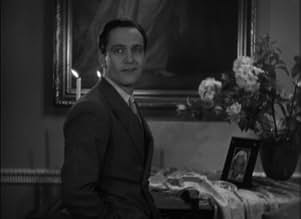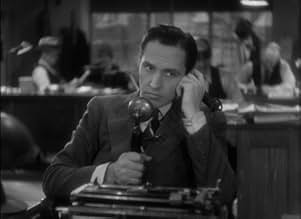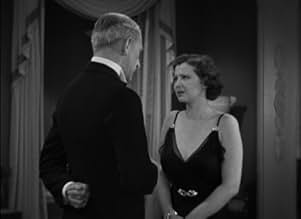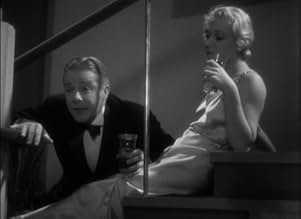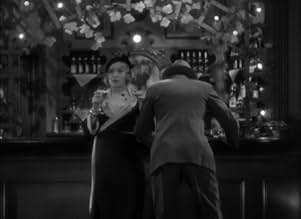IMDb RATING
6.9/10
2.3K
YOUR RATING
A drunken newspaperman is rescued from his alcoholic haze by an heiress whose love sobers him up and encourages him to write a play, but he lapses back into dipsomania.A drunken newspaperman is rescued from his alcoholic haze by an heiress whose love sobers him up and encourages him to write a play, but he lapses back into dipsomania.A drunken newspaperman is rescued from his alcoholic haze by an heiress whose love sobers him up and encourages him to write a play, but he lapses back into dipsomania.
- Director
- Writers
- Stars
- Awards
- 3 wins total
Richard 'Skeets' Gallagher
- Buck
- (as Skeets Gallagher)
Ernie Adams
- Reporter
- (uncredited)
Mildred Boyd
- June
- (uncredited)
Edna Callahan
- Bridesmaid
- (uncredited)
Leonard Carey
- Prentice's Butler
- (uncredited)
Harry Cording
- Fred
- (uncredited)
Milla Davenport
- Prentice's Housekeeper
- (uncredited)
- Director
- Writers
- All cast & crew
- Production, box office & more at IMDbPro
6.92.2K
1
2
3
4
5
6
7
8
9
10
Featured reviews
Not a happy picture but a very satisfying and wonderfully made one.
Although this story has been done a million times since, Dorothy Arzner's subtle yet brash film still has something different to say which makes this worth watching.
Being not just that rarest of 1930s Hollywood creatures: a woman film maker but also someone in an openly long term same sex relationship I wonder whether she had to try harder than her male contemporaries? She certainly delivers goods with this, imbuing energy and emotion into this very thoughtful drama. It's not just a simple story about alcoholism as it could easily have been considering this is 1932. It is a surprisingly deep examination of a strained and complex relationship which is particularly insightful for the time. Above all though it is a piece of entertainment. Unlike how this subject might be handled today, it doesn't get too bogged down in depressing misery but instead keeps the story moving forward, keeping your eyes glued to the screen with a really fast pace.
It's not just Ms Arzner's energetic yet thought provoking direction which elevates this above a lot of the output from 1932, it's Frederick March. Sylvia Sidney is fine in this (not as good as she was in CITY STREETS, Rouben Mamoulian's masterpiece made a year earlier) but she and the rest of the cast are just not on the same level as Mr March. His characterisation of someone who knows he could have everything yet also someone who knows he is going to destroy not just his own but his wife's life too and someone who knows he can't do anything to stop himself is incredibly natural, authentic and heartbreaking. He achieves this, even when he's being decidedly horrible by being so endearing and likeable. Of all the actors the 30s, he was one who had real depth and demonstrates this fully here making his character both fun and sad, ambitious yet weak and spineless, devoted yet deceitful... a real person.
Despite my gushing praise for this, or maybe because of it, I can't call this a great film. Because it's good I can't just compare it with other films of that era but have to put it in the same category of all pictures from the last hundred years. It's no MIDNIGHT COWBOY or TRAIN SPOTTING thus my fairly low rating... but as films from 1932 go, it's one of the best.
Being not just that rarest of 1930s Hollywood creatures: a woman film maker but also someone in an openly long term same sex relationship I wonder whether she had to try harder than her male contemporaries? She certainly delivers goods with this, imbuing energy and emotion into this very thoughtful drama. It's not just a simple story about alcoholism as it could easily have been considering this is 1932. It is a surprisingly deep examination of a strained and complex relationship which is particularly insightful for the time. Above all though it is a piece of entertainment. Unlike how this subject might be handled today, it doesn't get too bogged down in depressing misery but instead keeps the story moving forward, keeping your eyes glued to the screen with a really fast pace.
It's not just Ms Arzner's energetic yet thought provoking direction which elevates this above a lot of the output from 1932, it's Frederick March. Sylvia Sidney is fine in this (not as good as she was in CITY STREETS, Rouben Mamoulian's masterpiece made a year earlier) but she and the rest of the cast are just not on the same level as Mr March. His characterisation of someone who knows he could have everything yet also someone who knows he is going to destroy not just his own but his wife's life too and someone who knows he can't do anything to stop himself is incredibly natural, authentic and heartbreaking. He achieves this, even when he's being decidedly horrible by being so endearing and likeable. Of all the actors the 30s, he was one who had real depth and demonstrates this fully here making his character both fun and sad, ambitious yet weak and spineless, devoted yet deceitful... a real person.
Despite my gushing praise for this, or maybe because of it, I can't call this a great film. Because it's good I can't just compare it with other films of that era but have to put it in the same category of all pictures from the last hundred years. It's no MIDNIGHT COWBOY or TRAIN SPOTTING thus my fairly low rating... but as films from 1932 go, it's one of the best.
Excellent performances and daring subject matter
Clever dialogue, fantastic acting, and several great scenes made this film a delight for me, but be forewarned, its main character may have you saying 'grrr', and reduce your enjoyment. Frederic March plays a newspaper reporter / playwright who has a drinking problem, and it's while he's drunk at a party that he meets a charming young lady, played by Sylvia Sidney. The two hit it off and despite the concerns of her rich father (George Irving), get married. Things get complicated when his ex-lover (Adrianne Allen) re-surfaces and he struggles to control his problem.
It's a very strong cast all around, and Sidney in particular turns in a great performance. She ranges from a sweet, naïve, and trusting soul, loving unconditionally, to hurt and confused, to woman whose solution is to give her husband a taste of his own medicine, in a rather shocking development. The scene with her partying with her own young lover (Cary Grant no less) and his friends and quipping "Gentlemen, I give you the holy state of matrimony, modern style: single lives, twin beds and triple bromides in the morning" is sad, empowering, and a little thrilling all at the same time. As they're in a bar that's practically a den of iniquity, it's all clearly pre-code, but there is an intelligence and honesty in this scene, and throughout the movie.
March is also strong as this affable but flawed man, and in early scenes we smile at his partying, at one point yelling "Is there a baritone in the house?" until he finds a barman to fill out a quartet with his friends so that they can break out in song. The warning signs are there in his tardiness and even at his wedding, as he and his best man (Skeets Gallagher) fumble for the ring, which he's forgotten. That scene is one of several that are well directed by Dorothy Arzner, as she cuts to guests making observations and the facial reactions of March and Sidney as they say their vows.
There is a lot of partying and revelry which may put some viewers off, but I found that allowed for some fantastic moments. In one, March asks Sidney to shut the door and hold him back from going to the other woman, and in a strong way she opens it wide and says "I'm no jailer - get out!" In another, as March and Allen 'play-act' a passionate kiss to the merriment of others right in front of her, we feel the shock and humiliation amplified by her brilliant facial reaction.
The title is clearly meant to titillate, but the film has real substance beneath. It's wild, but also realistic, though I didn't care too much for the ending. We see what destructive behavior leads to, and in that I suppose there is a message, but it's delivered without heavy-handed moralizing. The plot is a tad melodramatic, but it's daring and unique in the areas it explores. Well worth checking out, if you're in the mood for pre-code.
It's a very strong cast all around, and Sidney in particular turns in a great performance. She ranges from a sweet, naïve, and trusting soul, loving unconditionally, to hurt and confused, to woman whose solution is to give her husband a taste of his own medicine, in a rather shocking development. The scene with her partying with her own young lover (Cary Grant no less) and his friends and quipping "Gentlemen, I give you the holy state of matrimony, modern style: single lives, twin beds and triple bromides in the morning" is sad, empowering, and a little thrilling all at the same time. As they're in a bar that's practically a den of iniquity, it's all clearly pre-code, but there is an intelligence and honesty in this scene, and throughout the movie.
March is also strong as this affable but flawed man, and in early scenes we smile at his partying, at one point yelling "Is there a baritone in the house?" until he finds a barman to fill out a quartet with his friends so that they can break out in song. The warning signs are there in his tardiness and even at his wedding, as he and his best man (Skeets Gallagher) fumble for the ring, which he's forgotten. That scene is one of several that are well directed by Dorothy Arzner, as she cuts to guests making observations and the facial reactions of March and Sidney as they say their vows.
There is a lot of partying and revelry which may put some viewers off, but I found that allowed for some fantastic moments. In one, March asks Sidney to shut the door and hold him back from going to the other woman, and in a strong way she opens it wide and says "I'm no jailer - get out!" In another, as March and Allen 'play-act' a passionate kiss to the merriment of others right in front of her, we feel the shock and humiliation amplified by her brilliant facial reaction.
The title is clearly meant to titillate, but the film has real substance beneath. It's wild, but also realistic, though I didn't care too much for the ending. We see what destructive behavior leads to, and in that I suppose there is a message, but it's delivered without heavy-handed moralizing. The plot is a tad melodramatic, but it's daring and unique in the areas it explores. Well worth checking out, if you're in the mood for pre-code.
"It is their husbands' faults if wives do fall." Shakespeare.
Cleo Lucas wrote 'I, Jerry, take thee Joan', her only novel, at the tender age of twenty-four and it has been adapted by Edwin Justus Mayer for Paramount whilst marking the last film directed for that studio by Dorothy Arzner before going freelance.
Early on in the film the newly engaged Jerry of Fredric March asks: "Have I a right to take a swell girl and make her a wife?" Thus setting the scene for another of Ms. Arzner's stealthy critiques of the married state.
As expected, her direction is impeccable, her editing seamless and the magnificent performances she has drawn from her two leading players makes this emotional rollercoaster riveting viewing.
The all-important chemistry between March and the enchanting Sylvia Sidney as Joan without which the film would not work, is palpable from the outset. Her character develops and grows in strength as the film progresses whilst in his fourth film for this director, his portrayal of a tragic drunk makes him perfect casting for the role of Norman Maine five years later. Classy English actress Adrianne Allen is Jerry's old flame whose reappearance spells disaster.
Ambivalence runs through Ms. Arzner's oeuvre, never more so than in the ending here which is both happy and deeply tragic.
Early on in the film the newly engaged Jerry of Fredric March asks: "Have I a right to take a swell girl and make her a wife?" Thus setting the scene for another of Ms. Arzner's stealthy critiques of the married state.
As expected, her direction is impeccable, her editing seamless and the magnificent performances she has drawn from her two leading players makes this emotional rollercoaster riveting viewing.
The all-important chemistry between March and the enchanting Sylvia Sidney as Joan without which the film would not work, is palpable from the outset. Her character develops and grows in strength as the film progresses whilst in his fourth film for this director, his portrayal of a tragic drunk makes him perfect casting for the role of Norman Maine five years later. Classy English actress Adrianne Allen is Jerry's old flame whose reappearance spells disaster.
Ambivalence runs through Ms. Arzner's oeuvre, never more so than in the ending here which is both happy and deeply tragic.
Precode directed by Dorothy Arzner
Frederick March and Sylvia Sidney star in "Merrily We Go to Hell," from 1932.
For those of us who only remember Sylvia Sidney as an older character actress -- and usually a pretty mouthy one at that -- seeing her as an ingénue is always a revelation.
Jerry Corbett (March) is a reporter and a drunk, still pining for the woman who broke his heart, Claire (Adrienne Allen). When he meets the lovely Joan Prentice (Sidney) from a wealthy family, the two fall for one another and marry.
Jerry wants to write plays, and he eventually is able to have one produced, early in the marriage. Unfortunately, one of the stars is Claire, and she's perfectly willing to take up where they left off. Jerry starts drinking again. Joan is heartbroken as well as hurt and starts drinking and partying herself. Finally, though, she returns to her father's home.
Nothing too surprising in the plot, but good performances all around. Sidney is pretty and vulnerable, taking a chance on a man her father disapproves of but whom she loves. March shows that Jerry is a weak man who in his heart doesn't believe he deserves the happiness he's had with Joan. Can these two find their way back to one another? Just guess.
Dorothy Arzner had a good sense of pacing, so the film doesn't drag or slow down. Worth seeing for the actors, not necessarily the story.
For those of us who only remember Sylvia Sidney as an older character actress -- and usually a pretty mouthy one at that -- seeing her as an ingénue is always a revelation.
Jerry Corbett (March) is a reporter and a drunk, still pining for the woman who broke his heart, Claire (Adrienne Allen). When he meets the lovely Joan Prentice (Sidney) from a wealthy family, the two fall for one another and marry.
Jerry wants to write plays, and he eventually is able to have one produced, early in the marriage. Unfortunately, one of the stars is Claire, and she's perfectly willing to take up where they left off. Jerry starts drinking again. Joan is heartbroken as well as hurt and starts drinking and partying herself. Finally, though, she returns to her father's home.
Nothing too surprising in the plot, but good performances all around. Sidney is pretty and vulnerable, taking a chance on a man her father disapproves of but whom she loves. March shows that Jerry is a weak man who in his heart doesn't believe he deserves the happiness he's had with Joan. Can these two find their way back to one another? Just guess.
Dorothy Arzner had a good sense of pacing, so the film doesn't drag or slow down. Worth seeing for the actors, not necessarily the story.
A real gem!
Some time ago I became the owner of the Pre-Code Hollywood Collection. Me was told to watch first Merrily We Go To Hell (1932), one of the six films within this collection. And really I can say... it is a gem on its own. Maybe because it is the first film I've seen from director Dorothy Arzner and the second film I've seen with Sylvia Sidney, I got besmitten from the start seeing her in Sabotage (1936), but I was taken away with the whole as a combination of acting, directing, the story and some gowns.
Fredric March is awesome playing the drunk man, and later husband, just right and not lost in overacting. The parties go on and on. The marriage is more the real thing and not the Hollywood marriage after the Production Code came about. It is nice to see a young Cary Grant, in his first year of acting. Later that year he would have his breakthrough I think I can say fairly with Blonde Venus.
All along the storyline I wondered what the movie is trying to tell us. There are a few good aspects told about how relations can be. First the character of Mrs. Sidney, Joan Prentice, is that of a woman in love and want to do everything for her man, even let him go towards another woman. The next stage is trying to win him back by jealousy and then, the last stage, leaving her husband for good. And you can say in Hollywood in those days they also want an happy ending, but... Sorry, I won't go into spoilers. I didn't expected it, but a real good movie to watch.
Fredric March is awesome playing the drunk man, and later husband, just right and not lost in overacting. The parties go on and on. The marriage is more the real thing and not the Hollywood marriage after the Production Code came about. It is nice to see a young Cary Grant, in his first year of acting. Later that year he would have his breakthrough I think I can say fairly with Blonde Venus.
All along the storyline I wondered what the movie is trying to tell us. There are a few good aspects told about how relations can be. First the character of Mrs. Sidney, Joan Prentice, is that of a woman in love and want to do everything for her man, even let him go towards another woman. The next stage is trying to win him back by jealousy and then, the last stage, leaving her husband for good. And you can say in Hollywood in those days they also want an happy ending, but... Sorry, I won't go into spoilers. I didn't expected it, but a real good movie to watch.
Did you know
- TriviaThe word "Hell" could not be used in the UK as part of a title, so the UK version was simply retitled "Merrily We Go to ____".
- GoofsIn the latter part of the picture Jerry Corbett (Fredric March) receives a letter in a postmarked envelope from his wife Joan (Sylvia Sidney). It's addressed to Jerry with his name and street address, but no city.
- Quotes
Joan Prentice: Gentlemen, I give you the holy state of matrimony, modern style: single lives, twin beds and triple bromides in the morning.
- ConnectionsFeatured in Women Make Film: A New Road Movie Through Cinema (2018)
- How long is Merrily We Go to Hell?Powered by Alexa
Details
- Runtime
- 1h 23m(83 min)
- Color
- Aspect ratio
- 1.37 : 1
Contribute to this page
Suggest an edit or add missing content

